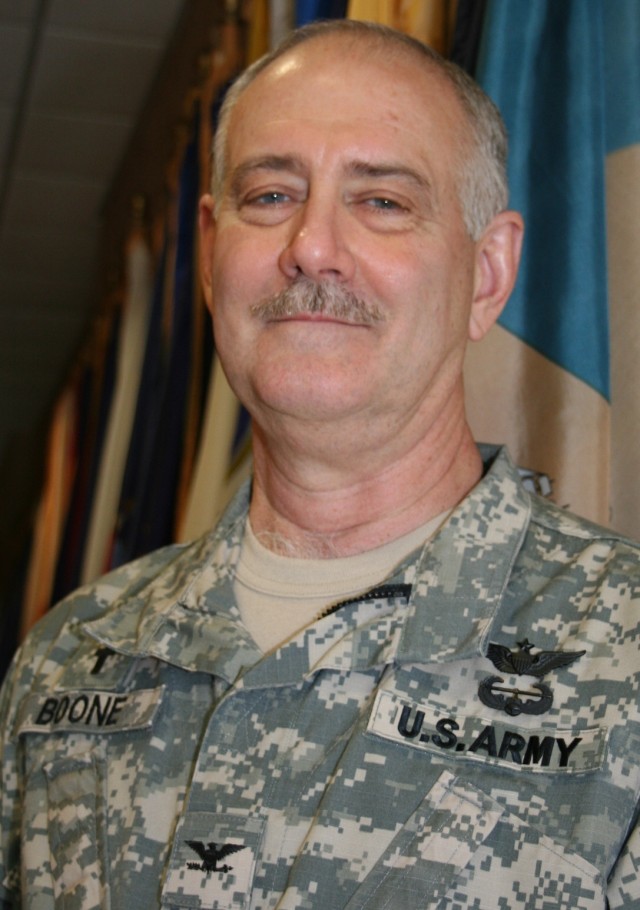FORT JACKSON, SC -- Exactly two years after its groundbreaking ceremony, today's dedication of the Armed Forces Chaplaincy Center signifies the beginning of a new era in the training of religious support personnel from all military branches.
The dedication ceremony marks the culmination of a five-year process that began when the Base Realignment and Closure initiative mandated that the chaplain schools for the Army, Air Force and Navy be co-located at Fort Jackson.
The Navy moved its Naval Chaplains School from Naval Station Newport, R.I. and its training for religious program specialists - the Navy equivalent of chaplain assistants - from Naval Air Station Meridian, Miss. to form a new school, the Navy Chaplaincy School and Center. The Air Force Chaplain Corps College moved from Maxwell Air Force Base, Ala. The U.S. Army Chaplain Center and School has been on Fort Jackson since 1996.
The new $12-million facility for the Air Force and Navy schools was scheduled to be completed last summer, but construction delays put a dent in the original plan. Instead, personnel for the two schools were temporarily housed in the former Hood Street School building.
Being uprooted without a new permanent home was a stressful experience at times, but also provided the opportunity for the Navy and Air Force teams to bond, said Air Force Chaplain (Col.) Steven Keith, commandant of the AFCCC and director of the AFCC.
"We were showing up with some of the same stresses, same emotions, feeling a bit uprooted, but at the same time seeing, 'Wow, there is some good in this,' because we now get to compare ministries, educational opportunities. We get to see what (we) are doing well and what, maybe, we are not doing so well that the other (service) is. With some humility and servant attitudes we really started comparing notes."
The exchange of information among chaplains from the three services quickly took off, Keith said.
"In a very synergistic way, we started immediately seeing the good of simply being in the same location, because communication became so much easier," he said. "It allowed us to build a relationship with these fellow ministers who happen to be doing their ministry in the Army, Air Force and Navy."
The initial reason for co-locating the three services' chaplain schools was to save costs, but training in the same location will be beneficial for chaplains who will deploy or work in a joint environment, said Army Chaplain (Col.) Samuel Boone, commandant of the USACHCS.
"We're going to have a new understanding of each other's way of operating," Boone said. "So you don't have to learn it the first day you hit the ground in Afghanistan. Our new chaplains will leave here with an understanding of how our sister services operate, how you request (of) them to give you support."
For the Navy, the move also marks the first time that chaplains and religious program specialist are trained in the same location, said Navy Chaplain (Capt.) Michael Langston, commanding officer of the NCSC.
"In our chaplain corps history, chaplains and RPs have never been trained together," Langston said. "Now, I train the chaplain and the RP right alongside each other. So the chaplain understands what the skill sets of the RP are, and the RP understands what the skill sets of the chaplain are."
Although the three schools remain separate entities, being co-located creates opportunities for students to train together. The potential for 44 hours of shared training has been identified for chaplains, and additional shared training is in the planning stages for Army chaplain assistants and Navy RPs, Keith said.
In addition, the three service schools share worship labs, a 300-seat auditorium and subject-matter experts who visit the AFCC for guest lectures.
In the long run, Keith said he expects that being in the same location will improve the education provided by the three service schools.
"We think the education is going to be much better ... because as we compare strengths and weaknesses and work together, we find a synergistic effect that is already making a difference in the level of our education," he said.
However, being on an Army installation also has drawbacks for members from other services, Langston said.
"All of our training took place in a Navy-centric environment where we put all of our officers and enlisted (personnel) through what we call the sailorization process," Langston explained. "The issue that we had when we moved from Newport, R.I. to Fort Jackson was that we located to an Army-centric post. The reception here has been great, and we've been accommodated in all of our needs, but when our chaplains and RPs are going through their training and they step outside their training environment ... they run into a Soldier and that sailorization process doesn't continue."
Langston said that new chaplains and RPs visit Navy, Coast Guard and Marine Corps installations in Florida and South Carolina during their training here to continue the sailorization process.
Both Keith and Langston expressed gratitude for the way they have been received on an Army installation by members and leaders of the Fort Jackson community.
"They might not understand us," Langston said. "We do things a little different, and we wear a different uniform, but they have really accommodated our needs. And I am so proud of how they have done that. And I'm thankful. We've been blessed."
Langston said that the AFCC can serve as a model of cooperation between the services.
"We will show the Department of Defense that it can be done, that we are collegial, we have strong relationships and that we can work together," he said. "My sincere hope is that we will fully come to understand that we're one team. And that we're not only colleagues in the Army or the Air Force or the Navy, but we're colleagues as one entity serving our country."
More than 2,700 chaplains, chaplain assistants and religious program specialists will be trained annually at the center.






Social Sharing